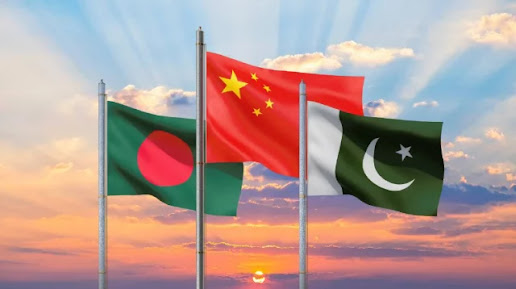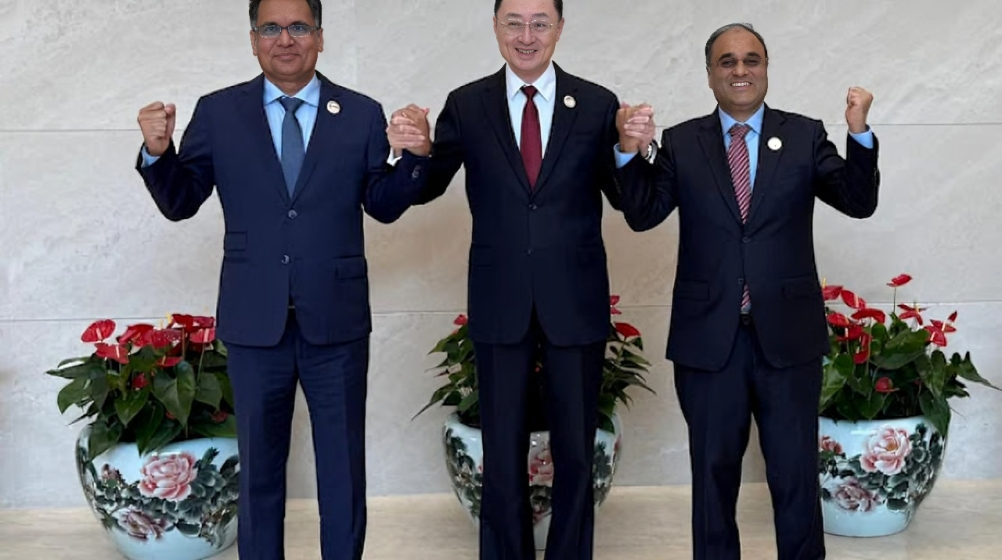In a significant geopolitical move, China Trilateral Meeting with Pakistan and Bangladesh was hosted for the first time in Kunming, China. The foreign secretaries of all three nations came together for this high-level interaction, with many experts calling it a major diplomatic event that could have serious implications for India.
This China Trilateral Meeting was conducted to discuss deepening regional cooperation on several strategic fronts including trade, investment, health, education, and maritime affairs. China’s Foreign Ministry emphasized that the three countries were committed to mutual trust, neighborly cooperation, equality, inclusiveness, and shared development.
However, China’s remark that the meeting was not “directed at any third party” is being interpreted by analysts as a veiled reference to India. The China Trilateral Meeting came at a time of shifting political dynamics in South Asia, raising alarms in New Delhi.
Official Statements Signal Regional Realignment
According to an official release from China’s Ministry of Foreign Affairs, the China Trilateral Meeting held in Yunnan province was aimed at promoting a true sense of multilateralism and regional openness. The foreign secretaries reached consensus on enhancing cooperation in sectors like agriculture, digital economy, green infrastructure, marine science, and people-to-people exchanges.
The China Trilateral Meeting was co-chaired by Chinese Vice Foreign Minister Sun Weidong, Bangladesh’s Acting Foreign Secretary Ruhul Alam Siddique, and Pakistan’s Foreign Secretary Aamna Baloch, who attended virtually. The event also saw a proposal to form a working group to implement trilateral cooperation projects and uphold agreements.
China’s Diplomatic Messaging and India’s Concerns
Observers note that this China Trilateral Meeting is part of Beijing’s strategy to exert greater influence in South Asia. China’s indirect message regarding a “third party” is being perceived as a warning to India, which has historically maintained strong ties with Bangladesh.
At a time when India is closely watching regional diplomacy, such a move could signal Beijing’s intent to form a tighter strategic partnership with countries in India’s neighborhood. While the China Trilateral Meeting emphasized cooperation, the timing and participants are seen as geopolitically symbolic.
Pakistan, Bangladesh, and Changing South Asian Dynamics
The China Trilateral Meeting took place at a politically sensitive juncture in South Asia, coinciding with a notable shift in diplomatic ties between Pakistan and Bangladesh. After more than 15 years of minimal engagement, the two countries reinitiated high-level diplomatic dialogues earlier this year in April. This resumption of talks marked a significant departure from the frosty relations seen during the long rule of former Bangladeshi Prime Minister Sheikh Hasina, under whose leadership diplomatic ties with Pakistan were notably strained due to historical and political differences.

At the center of this shift is Mohammad Yunus, who currently leads Bangladesh’s interim government. Yunus has adopted a markedly different foreign policy stance from that of Hasina. Unlike the previous government, Yunus appears more open and accommodating toward Pakistan. His diplomatic posture became especially evident when he publicly criticized India for allegedly providing refuge to Sheikh Hasina, who stepped down following political unrest and electoral tensions. In a further escalation, Yunus formally requested India to extradite Hasina back to Bangladesh—a move that many experts see as a challenge to New Delhi’s influence in the region. As of now, India has chosen not to respond to this request, maintaining a strategic silence.
This unfolding political realignment has added substantial complexity to the China Trilateral Meeting. With Bangladesh showing signs of pivoting away from India’s sphere of influence and moving closer to Pakistan and China, the regional balance of power may be shifting. Analysts believe this new trilateral engagement, under China’s initiative, could be part of a broader geopolitical strategy to counter India’s traditional dominance in South Asia.
As a result, India may now be compelled to reassess and recalibrate its foreign policy, particularly its relations with neighboring countries like Bangladesh. The China Trilateral Meeting thus serves not only as a platform for economic and regional cooperation but also as a potential turning point in South Asia’s diplomatic and strategic landscape.
Source | ndtv
Two Month Murder Mystery Solved: Faridabad Woman Buried by In-Laws in 10-Foot Pit | Full Story


[…] China’s Game-Changing Trilateral with Pakistan and Bangladesh: Strategic Message Aimed at India? […]